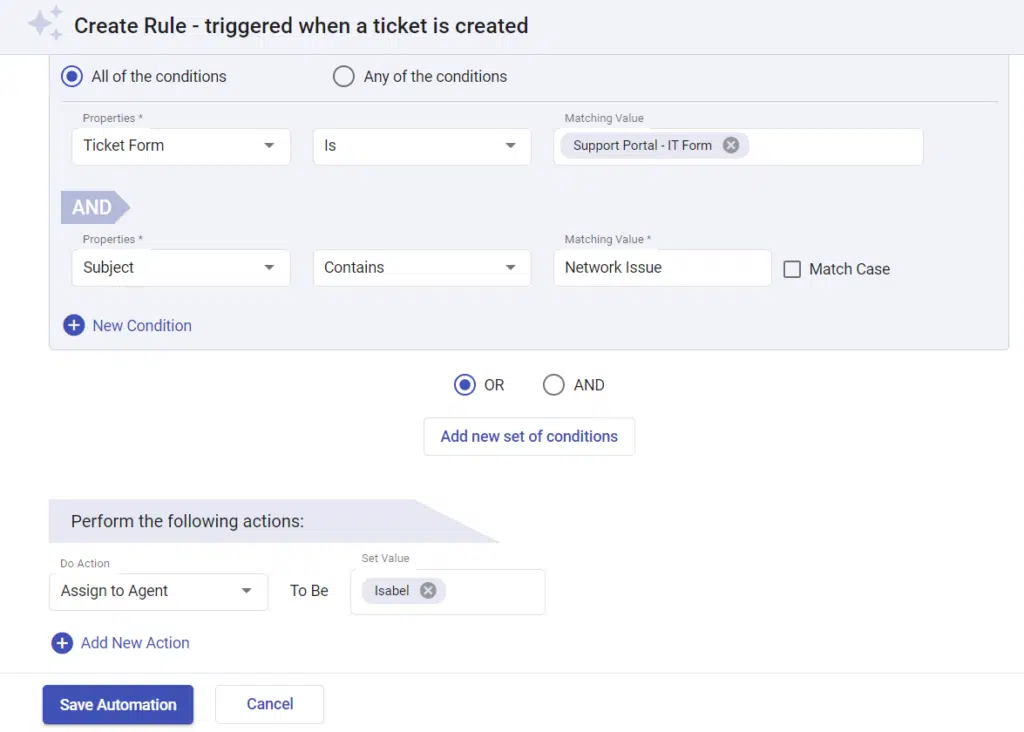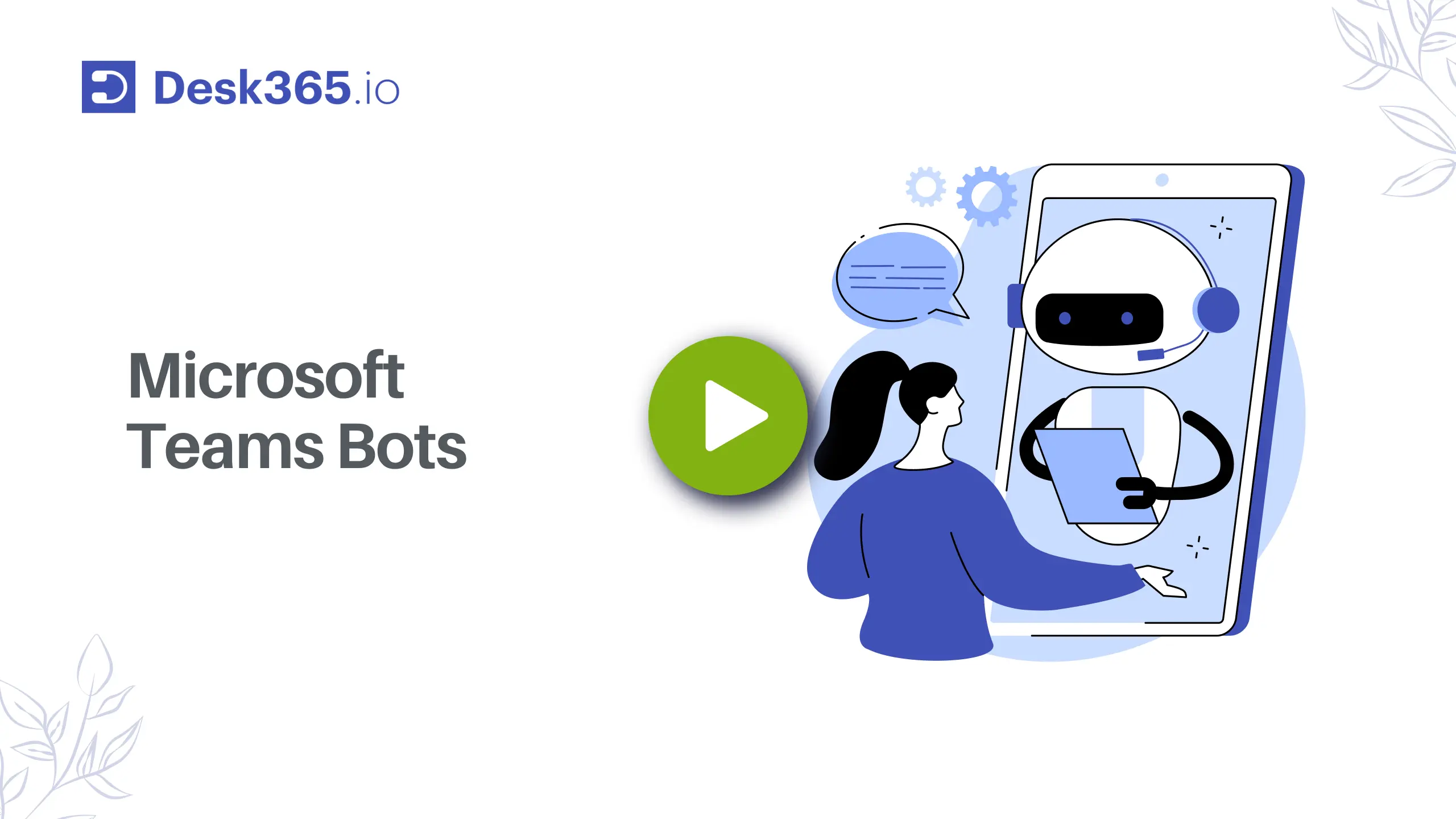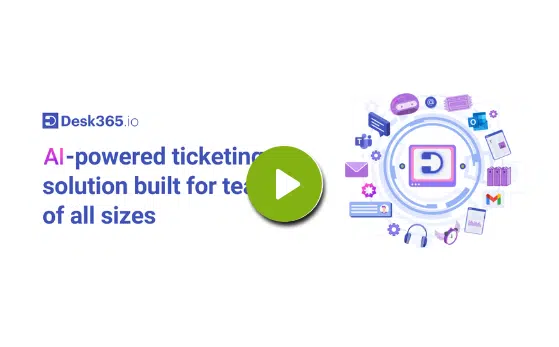In today’s competitive landscape, a company’s success increasingly depends on how well it meets or exceeds customer expectations. Ticket routing plays a crucial role in achieving this, as it helps streamline support operations, saves valuable time for support agents, and ensures no customer request goes unresolved.
While it may seem simple to assign tickets to the appropriate departments, such as directing HR-related inquiries to the human resource department or IT issues to the tech team, managing thousands of support requests can quickly become overwhelming. This is where advanced ticketing systems with automated workflows come into play, helping organizations efficiently handle large volumes of tickets without unnecessary delays.
In this blog, we’ll break down the in and out of ticket routing, explore its benefits, and see how it can help create a seamless customer experience.

How does ticket routing help in customer service?
Quick Summary (TL;DR)
✅ Get tickets to the right agent faster
✅ Use round-robin, skills, workload, or AI to auto-assign
✅ Faster replies = happier customers
✅ Less stress for your team
✅ Better SLAs, fewer missed issues
✅ Tools like Desk365 make it easy with smart, flexible routing
What is automated ticket routing?
In the past, ticket routing was done manually. Now, with automation, tickets are routed faster and more accurately. Automation rules can be set up to direct tickets based on certain criteria, such as ticket content or keywords, ensuring that the right agent gets the ticket without human intervention.

Recommended Reading: Help Desk Automation: The Ultimate Guide & Top 7 Tools
Why is automated ticket routing important?
Efficient ticket routing can significantly improve customer satisfaction. The faster a ticket reaches the right support agent, the quicker it can be resolved, which leads to good customer service outcomes. Misrouting tickets, on the other hand, can lead to confusion and delays, ultimately frustrating customers.
How ticket routing workflow improves customer service?
Helpdesk ticket routing happens behind the scenes, but its effects are very visible to customers. Nothing is more frustrating for a customer than waiting a long time or being passed from one support agent to another. Without a proper ticket routing workflow, misassignments can lead to confusion among agents, delaying ticket resolution and hurting customer satisfaction.
Ticket routing removes the burden from support agents and streamlines the process, making it easier for customers to get help faster and more efficiently.
The impact of ticket routing on customer support
An efficient ticket routing method is essential for managing day-to-day customer support and is not a luxury but a necessity. With an effective system, you’ll see:
Faster first responses
New tickets get assigned to the right support agents quickly, improving the first response times.
Quicker resolutions
Skilled agents get tickets suited to their expertise, allowing for faster ticket resolution.
Higher customer satisfaction
Quick resolutions lead to happier customers and increased loyalty.
Better workload management
Tickets are distributed fairly among agents, reducing burnout and keeping agent productivity high.
Recommended Reading: How to Improve Customer Service Response Times?
Ticket routing methods
Now that we’ve covered the basics, let’s explore some popular methods for ticket routing:
1. Round-Robin routing
In this method, tickets are distributed evenly among agents. This is best when all agents have similar skills.
2. Rule-based routing
Tickets are assigned based on pre-set rules, such as ticket priority or type. This is ideal for teams with clearly defined categories of issues.
3. Load-based routing
This is similar to Round-Robin, but with consideration for each agent’s current workload. This ensures agents aren’t overwhelmed with too many tickets at once
4. Skill-based routing
Here, tickets are assigned based on the agent’s skill set. For example, technical issues go to agents with technical expertise.
5. Priority-based routing
In this method, tickets are assigned to the agents based on the ticket priority. More urgent issues are addressed first, while lower-priority tickets are handled later.
6. AI-powered routing
Artificial intelligence evaluates ticket content and assigns it to the appropriate agent based on past resolutions. This is ideal for organizations handling large volumes of complex tickets.
How to optimize customer service ticket routing?
If you’re considering using a ticket routing option for your helpdesk, here are a few important best practices to keep in mind:
1. Select the right helpdesk ticketing system
To start, it’s crucial to choose a ticketing system that fits your business needs. Look for one that offers flexible routing options and integrates well with your existing tools.
Recommended Reading: Why choose Desk365 over other helpdesks?
2. Ensure proper ticket logging
Make sure all incoming support tickets are accurately logged into your helpdesk. Assign them to the correct categories, so they can be routed efficiently to the right department or support agent.
3. Set clear escalation rules for urgent tickets
It’s important to have rules in place for handling high-priority tickets. Set specific Service Level Agreements (SLAs) to ensure that urgent issues are escalated and addressed promptly.
4. Build a strong knowledge base
A well-organized knowledge base can help reduce the volume of incoming tickets. If customers can easily find answers on their own, they’ll be less likely to submit tickets for common issues, freeing up your team to focus on more complex problems.
5. Integrate your helpdesk with a CRM tool
Integrating your helpdesk with a Customer Relationship Management (CRM) tool allows for more accurate routing rules. This ensures that customer information is up-to-date and tickets are directed to the most suitable agent based on the customer’s history.
6. Educate your support agents
Make sure your support agents understand how the ticket routing system works. When agents know the logic behind the process, they can work more efficiently and ensure that tickets are handled correctly.
7. Review and update routing rules regularly
Regularly reviewing and adjusting your routing rules helps keep your system running smoothly. As your business evolves, your routing needs may change, so it’s important to update the system accordingly.
8. Leverage AI to handle common queries
Using AI tools to address frequently asked questions can significantly reduce the number of tickets coming in. Automating responses to common issues allows your agents to focus on more complex or unique cases.
Benefits of ticket routing
- Faster resolutions: Tickets are assigned immediately, leading to quicker resolutions.
- Balanced workload: Agents get tickets based on availability and current workload, which prevents burnout and improves productivity.
- Reduced errors: Automation reduces the likelihood of misassignments and human error.
- Increased productivity: Tickets are routed to agents with the right skills, leading to faster resolutions and happier customers.
- Cost savings: Faster ticket resolution improves helpdesk efficiency, lowering operational costs and improving scalability.
- Consistent customer experience: Customers no longer have to repeat their issues to multiple agents, improving their overall experience.
- Data-driven insights: Automated systems provide reporting and analytics, helping you track performance and make informed business decisions.
Challenges in ticket routing
- Spike in ticket volume: A sudden surge in incoming tickets can overwhelm your helpdesk. Dynamic routing rules and volume handling plans are essential for avoiding bottlenecks.
- Complex requests: As your business grows, customer requests may become more complex and harder to categorize. Regularly reviewing and optimizing routing rules is key to keeping things efficient.
- Resistance to change: Your support team may be hesitant to adopt a new system. Proper training can help them understand the benefits and make the transition smoother.
How to measure the success of your ticket routing software?
To know if your routing system is working well, you can look at a few key indicators:
Faster ticket resolution time
One of the main goals of ticket routing is to get tickets resolved faster. If your system is effective, the average time it takes to resolve a ticket should start to decrease. This shows that tickets are being directed to the right people who can handle them quickly.
Higher first contact resolution rate
A successful routing system should also improve your first contact resolution rate. This means more issues are being solved on the first try, without needing multiple follow-ups. If you notice an increase here, it’s a good sign your system is doing its job by sending tickets to the right agents from the start.
Improved customer satisfaction (CSAT) scores
A well-functioning routing system should lead to happier customers. When tickets are resolved quickly and effectively, customers are more satisfied. An increase in your CSAT score is a strong indicator that your routing system is improving overall service quality.
Balanced workload among support agents
Check the productivity reports from your helpdesk. A good routing system ensures that tickets are fairly distributed among your agents. You should see a more even balance in the number of tickets assigned to each agent, the number of tickets they’re currently handling, and how many they’ve resolved. This balance helps maintain steady productivity and prevents overloading any single agent.
By regularly monitoring these areas, you can determine if your ticket routing system is efficient and contributing to overall better service.
Check out our glossary of helpdesk terms to learn commonly used customer support terminology
AI – The future of ticket routing
In the future, AI’s role in ticket routing will continue to evolve. AI algorithms will become more sophisticated, learning to understand not only the customer’s immediate issue but also their overall sentiment and emotional state. This will allow support teams to provide more empathetic and tailored responses, improving the overall customer experience.
AI will also integrate more closely with other customer service tools, such as chatbots, voice assistants, and knowledge bases. This will create a seamless, end-to-end support system where AI can resolve simpler issues automatically and escalate more complex ones to human agents when necessary.
How can AI enhance ticket routing?
- Predictive ticket routing: AI can analyze past patterns to anticipate issues and prepare solutions before tickets even arrive, leading to faster resolutions and preventing recurring problems.
- Contextual understanding: AI can go beyond keywords, understand the full context of customer requests, and route them to the best-suited agent for quicker, more accurate resolutions.
- Tailored support: By considering a customer’s history, AI can assign tickets to agents familiar with similar cases, offering personalized support that boosts customer satisfaction.
- Real-time adaptation: AI can adjust ticket routing dynamically based on agent workload, ensuring timely responses by redistributing tickets when necessary.
- Continuous learning: AI can learn from every interaction, improving its ability to recognize patterns and optimize workflows for faster, more accurate routing over time.
- Improved accuracy and reduced errors: AI can reduce misrouting errors by using data-driven insights, ensuring tickets reach the right agent on the first try, leading to quicker resolutions.
- Scalability: As ticket volumes increase, AI can efficiently manage larger workloads, prioritizing urgent cases without compromising service quality.
AI-driven ticket routing can offer faster resolutions, improved customer experiences, and scalable operations. As AI continues to advance, it will become essential for delivering personalized, high-quality support at scale. Adopt to the new technology strategically, always prioritizing customer experience.
Recommended Reading: 8 Easy Ways to Deliver Personalized Customer Service
How Desk365 supports ticket routing?
Desk365 offers ticket routing solutions that streamline your support process, allowing your helpdesk to handle a high volume of tickets without compromising service quality. By leveraging the ticket routing methods, Desk365 helps you improve first response times, ensure fair ticket distribution, and ultimately enhance the overall customer experience.
The Round-Robin system automates the process of ticket assignment, ensuring that tickets are evenly distributed among agents. Depending on your setup, Desk365 offers two types of Round-Robin:
Classic Round-Robin
This method distributes tickets in a fixed, circular order among available agents. It doesn’t take into account how many tickets an agent already has, making it ideal for teams where all agents have similar responsibilities and workloads.
Learn more about the Classic Round-Robin method
Load-aware Round-Robin
In contrast, this method considers each agent’s current workload. Agents with fewer tickets are prioritized, helping to balance workloads and prevent burnout. It’s especially useful in fast-paced environments where agents may be handling varying numbers of tickets at once.
Learn more about the Load-aware Round-Robin method
Key benefits of using Desk365’s ticket routing system
1. Balanced workloads
Automatically distributes tickets fairly among agents, ensuring that no single agent is overwhelmed.
2. Improved efficiency
Automation reduces the need for manual intervention, freeing up time for support agents to focus on resolving tickets.
3. Custom agent statuses
Admins can set up custom availability statuses, ensuring that support agents only receive tickets when they are able to handle them.
4. Prevents overloading
With the Load-aware method, agents with lighter workloads are prioritized, preventing any one agent from being overwhelmed with too many tickets.
5. Transparency
You can track ticket assignments and agent availability, giving managers clear insights into performance and workload distribution.
Experience Seamless Ticket Routing with Desk365
Streamline your customer support with Desk365’s automated ticket routing and assignment options. Whether it’s Classic Round-Robin or Load-aware methods, Desk365 ensures efficient ticket distribution and balanced workloads.
With customer expectations constantly rising, automating ticket routing is necessary for delivering consistent and high-quality service. Whether through rule-based routing, skill-based routing, or advanced options like AI-powered systems, the right method ensures that tickets are swiftly directed to the most suitable agents, leading to faster resolutions and higher customer satisfaction.
Desk365’s automated ticket routing system, particularly the Round-Robin method, is an invaluable tool for balancing workloads, improving efficiency, and enhancing transparency in the ticket assignment process. Whether using Classic or Load-aware Round-Robin, Desk365 ensures that tickets are assigned fairly and efficiently while keeping agent availability and workload in mind. This not only prevents agent burnout but also helps teams handle a higher volume of tickets without sacrificing service quality.
By automating ticket routing with Desk365, your organization can boost productivity, streamline workflows, and ultimately deliver a better customer experience. Try out Desk365’s 21-day free trial to explore these features firsthand.
Frequently asked questions
Ticket routing refers to the process of assigning incoming customer support tickets to the most suitable team or support agent for resolution.
A routing ticket is a customer support request that needs to be classified and sent to the appropriate team or support agent. The ticket’s content, such as the nature of the issue or its urgency, helps determine which agent or department will handle the ticket.
- Classic Round-Robin assigns tickets in a circular order, distributing them equally among all available agents, regardless of their current workload.
- Load-aware Round-Robin takes into account how many tickets an agent is already handling, giving preference to agents with fewer tickets to ensure balanced workloads.
Yes, Desk365 can prioritize urgent tickets in the routing process. Automation rules take precedence over the Round-Robin system, allowing you to assign urgent tickets directly to specific agents.







